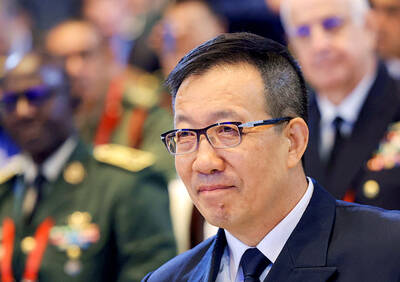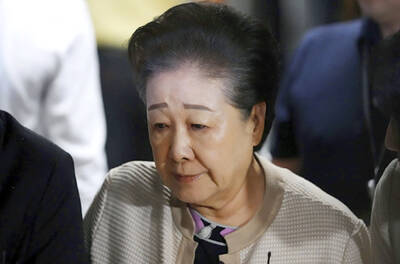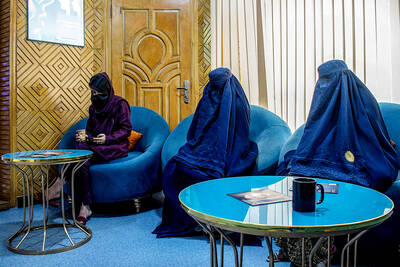Islamic militants in the Philippines have agreed to release one of three kidnapped aid workers following deadly clashes with advancing troops, a Red Cross official said.
Senator Richard Gordon, who heads the local Red Cross chapter, told AFP the military was preparing to “reposition” its troops on southern Jolo island to allow for a transfer to take place.
Gordon said he secured the commitment to free one hostage from Abu Sayyaf leader Albader Parad late on Wednesday, prompting him to hold emergency meetings with top defense and military officials.
“The military is going to redeploy out of the area so one of our associates can get out,” Gordon said.
“Soon as they pull out, the ICRC individual is going to go out,” he added, referring to the International Committee of the Red Cross.
He said it was unclear which of the ICRC workers — Mary Jean Lacaba of the Philippines, Andreas Notter of Switzerland and Eugenio Vagni of Italy — would be first out but it would be the one most in need of medical attention.
Previous reports have said Vagni, 62, has a heart condition.
Gordon said it was also unclear when the actual handover would take place, but stressed troops were now preparing to move.
He added that as soon as one hostage is freed, a former Muslim separatist leader would act as a negotiator for further talks to get the other two out.
“We don’t want any more incidents to happen that will thwart” the release, Gordon said.
The Abu Sayyaf, or “bearers of the sword,” is the smallest but most radical of several Islamic militant groups in the southern Philippines.
Set up with funds from the al-Qaeda network of Osama bin Laden, it has been accused of the worst terror attacks in the Philippines, including a February 2004 ferry bombing in Manila which claimed more than 100 lives.
It is on the US government’s list of foreign terrorist organizations.
The group has kidnapped dozens of foreigners over the years and is blamed for the deaths of two Americans seized at a resort in 2001, one of whom was beheaded.
In a statement, the military said it had agreed to reposition its forces, but stressed it would not pull out totally from the jungle where the hostages are being kept.
“The safety of the ICRC workers remains the paramount concern,” it said. “If to ensure this we must adjust our deployment, then we will do so.”
It promised to “reposition our troops as necessary to allow the exhaustion of other peaceful means for the safe release of victims.”
Troops have been closing in on the Abu Sayyaf group, resulting in two days of clashes on Monday and Tuesday that left three Marines and two militants dead and 19 soldiers wounded.
The military believes one of those injured among the militants was Parad, whose group snatched the ICRC workers while they were on a mission on Jolo on Jan. 15.
Gordon had earlier chastised the military for conducting what he called an ill-conceived rescue operation that had put the hostages’ lives in danger.
Earlier, the ICRC issued a statement from Geneva saying it had “taken note of the direct threats” by the Abu Sayyaf and appealed to them not to harm the abductees.

COMFORT WOMEN CLASH: Japan has strongly rejected South Korean court rulings ordering the government to provide reparations to Korean victims of sexual slavery The Japanese government yesterday defended its stance on wartime sexual slavery and described South Korean court rulings ordering Japanese compensation as violations of international law, after UN investigators criticized Tokyo for failing to ensure truth-finding and reparations for the victims. In its own response to UN human rights rapporteurs, South Korea called on Japan to “squarely face up to our painful history” and cited how Tokyo’s refusal to comply with court orders have denied the victims payment. The statements underscored how the two Asian US allies still hold key differences on the issue, even as they pause their on-and-off disputes over historical

BEIJING FORUM: ‘So-called freedom of navigation advocated by certain countries outside the region challenges the norms of international relations,’ the minister said Chinese Minister of National Defense Dong Jun (董軍) yesterday denounced “hegemonic logic and acts of bullying” during remarks at a Beijing forum that were full of thinly veiled references to the US. Organizers said that about 1,800 representatives from 100 countries, including political, military and academic leaders, were in Beijing for the Xiangshan Forum. The three-day event comes as China presents itself as a mediator of fraught global issues including the wars in Ukraine and Gaza. Addressing attendees at the opening ceremony, Dong warned of “new threats and challenges” now facing world peace. “While the themes of the times — peace and development —

BRIBERY ALLEGATIONS: A prosecutor said they considered the risk of Hak-ja Han tampering with evidence to be very high, which led them to seek the warrant South Korean prosecutors yesterday requested an arrest warrant for the leader of the Unification Church, Hak-ja Han, on allegations of bribery linked to the country’s former first lady and incitement to destroy evidence. The move came a day after the 82-year-old was questioned over her alleged role in bribing former first lady Kim Keon-hee and a lawmaker. Founded in 1954 by her late husband, Sun Myung Moon, the Unification Church has long been the subject of controversy and criticism, with its teachings centered on Moon’s role as the “second coming” and its mass weddings. Followers are derisively referred to as “Moonies.” However, the church’s

Decked out with fake crystal chandeliers and velvet sofas, cosmetic surgery clinics in Afghanistan’s capital are a world away from the austerity of Taliban rule, where Botox, lip filler and hair transplants reign. Despite the Taliban authorities’ strict theocratic rule, and prevailing conservatism and poverty in Afghanistan, the 20 or so clinics in Kabul have flourished since the end of decades of war in the country. Foreign doctors, especially from Turkey, travel to Kabul to train Afghans, who equally undertake internships in Istanbul, while equipment is imported from Asia or Europe. In the waiting rooms, the clientele is often well-off and includes men